E-business and E-learning Strategies in Developing Economies Report
VerifiedAdded on 2022/10/09
|13
|2889
|26
Report
AI Summary
This report analyzes the impact of e-business and e-learning strategies in developing economies, with a particular focus on the Asia-Pacific region. It examines various factors influencing technological innovation, e-commerce growth, and e-learning adoption, including government policies, infrastructure, and cultural considerations. The report reviews articles on technological development, e-commerce guidelines, e-learning in agriculture, small business perceptions, barriers to e-business adoption, mobile e-learning, e-learning acceptance, e-government challenges, ERP training strategies, and the effect of social media. The analysis covers the challenges and opportunities associated with e-business and e-learning, offering insights into how these strategies can contribute to economic growth, enhance education, and improve business practices in developing countries. The report emphasizes the importance of understanding the socio-economic context and adapting strategies to address specific regional needs.
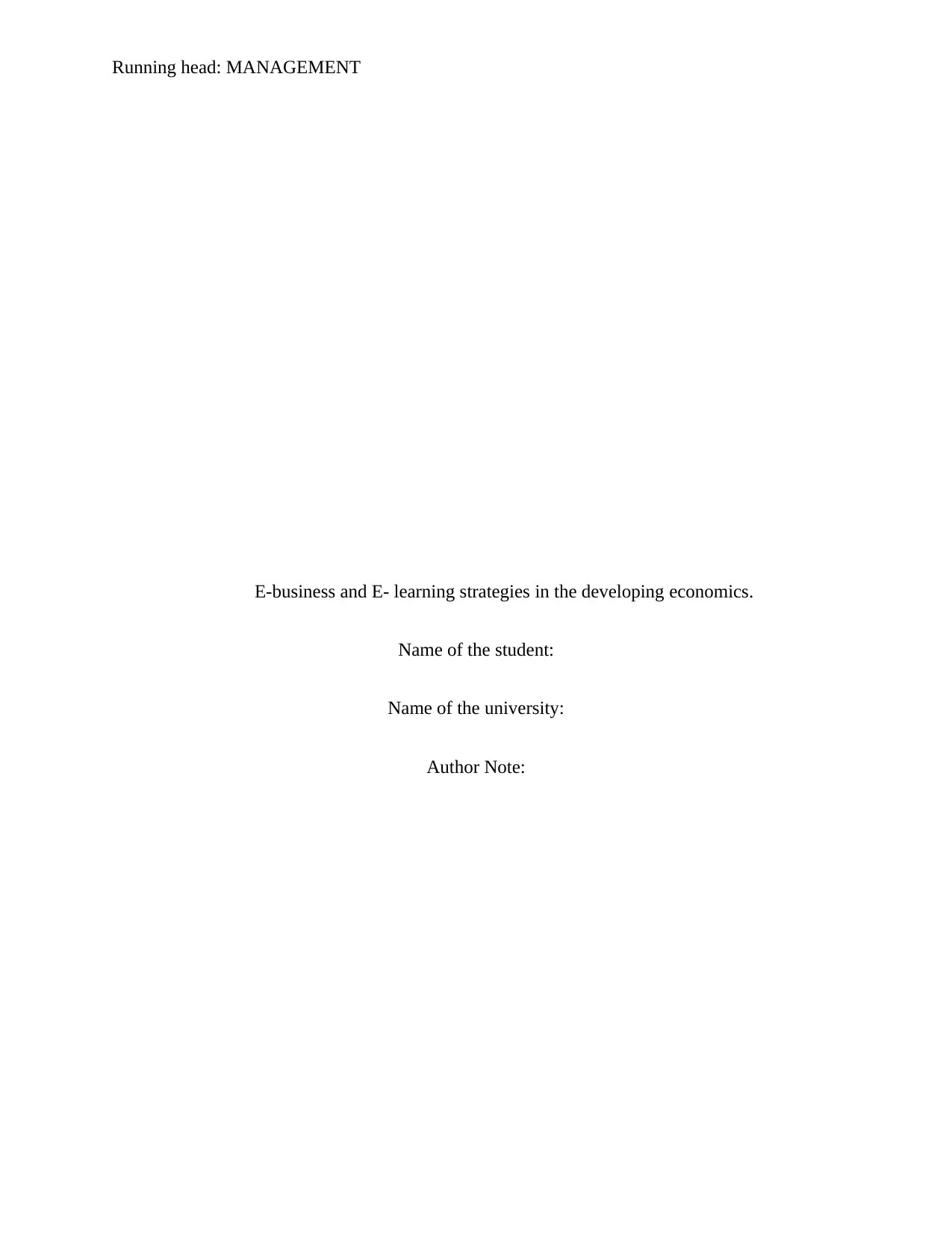
Running head: MANAGEMENT
E-business and E- learning strategies in the developing economics.
Name of the student:
Name of the university:
Author Note:
E-business and E- learning strategies in the developing economics.
Name of the student:
Name of the university:
Author Note:
Paraphrase This Document
Need a fresh take? Get an instant paraphrase of this document with our AI Paraphraser
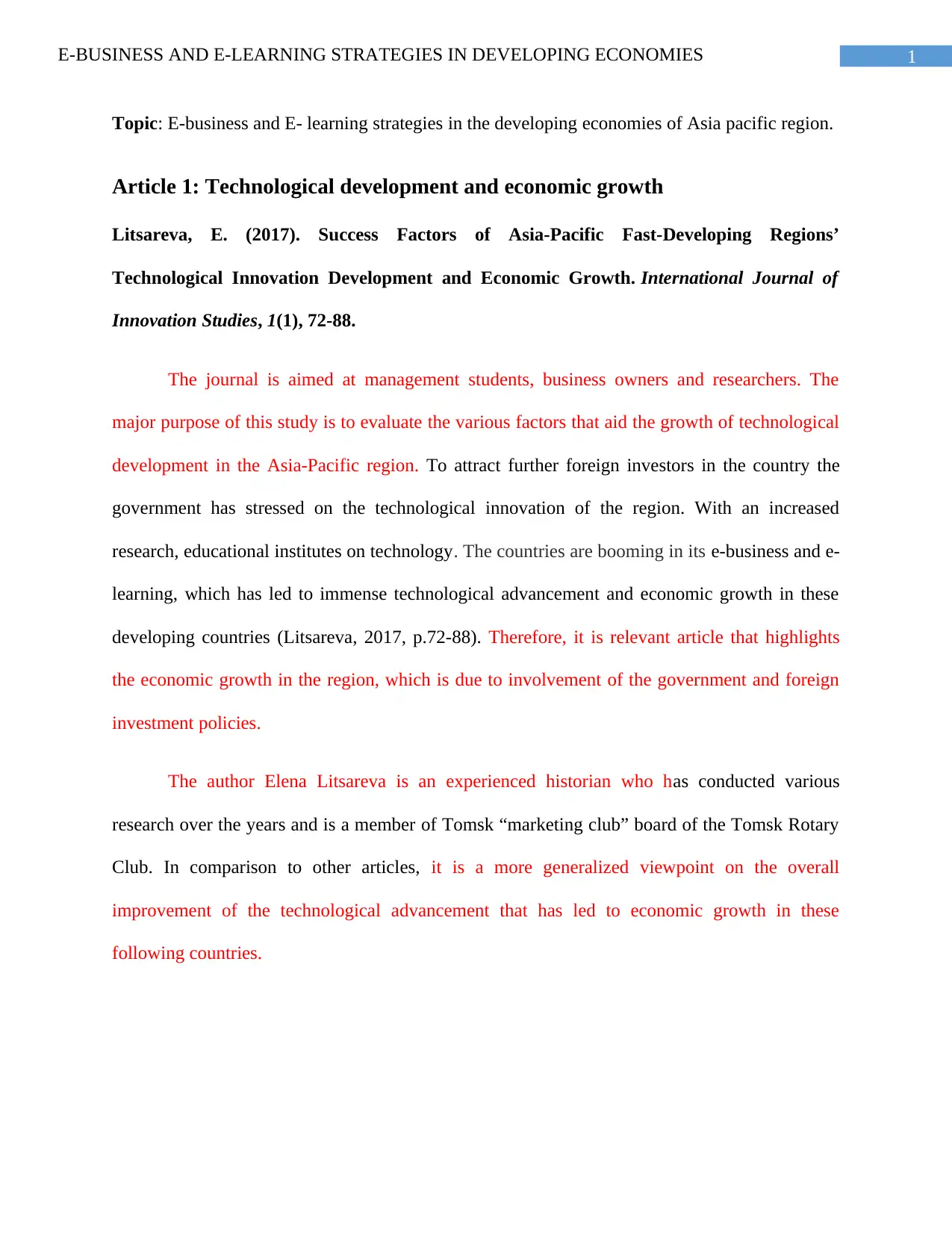
1E-BUSINESS AND E-LEARNING STRATEGIES IN DEVELOPING ECONOMIES
Topic: E-business and E- learning strategies in the developing economies of Asia pacific region.
Article 1: Technological development and economic growth
Litsareva, E. (2017). Success Factors of Asia-Pacific Fast-Developing Regions’
Technological Innovation Development and Economic Growth. International Journal of
Innovation Studies, 1(1), 72-88.
The journal is aimed at management students, business owners and researchers. The
major purpose of this study is to evaluate the various factors that aid the growth of technological
development in the Asia-Pacific region. To attract further foreign investors in the country the
government has stressed on the technological innovation of the region. With an increased
research, educational institutes on technology. The countries are booming in its e-business and e-
learning, which has led to immense technological advancement and economic growth in these
developing countries (Litsareva, 2017, p.72-88). Therefore, it is relevant article that highlights
the economic growth in the region, which is due to involvement of the government and foreign
investment policies.
The author Elena Litsareva is an experienced historian who has conducted various
research over the years and is a member of Tomsk “marketing club” board of the Tomsk Rotary
Club. In comparison to other articles, it is a more generalized viewpoint on the overall
improvement of the technological advancement that has led to economic growth in these
following countries.
Topic: E-business and E- learning strategies in the developing economies of Asia pacific region.
Article 1: Technological development and economic growth
Litsareva, E. (2017). Success Factors of Asia-Pacific Fast-Developing Regions’
Technological Innovation Development and Economic Growth. International Journal of
Innovation Studies, 1(1), 72-88.
The journal is aimed at management students, business owners and researchers. The
major purpose of this study is to evaluate the various factors that aid the growth of technological
development in the Asia-Pacific region. To attract further foreign investors in the country the
government has stressed on the technological innovation of the region. With an increased
research, educational institutes on technology. The countries are booming in its e-business and e-
learning, which has led to immense technological advancement and economic growth in these
developing countries (Litsareva, 2017, p.72-88). Therefore, it is relevant article that highlights
the economic growth in the region, which is due to involvement of the government and foreign
investment policies.
The author Elena Litsareva is an experienced historian who has conducted various
research over the years and is a member of Tomsk “marketing club” board of the Tomsk Rotary
Club. In comparison to other articles, it is a more generalized viewpoint on the overall
improvement of the technological advancement that has led to economic growth in these
following countries.
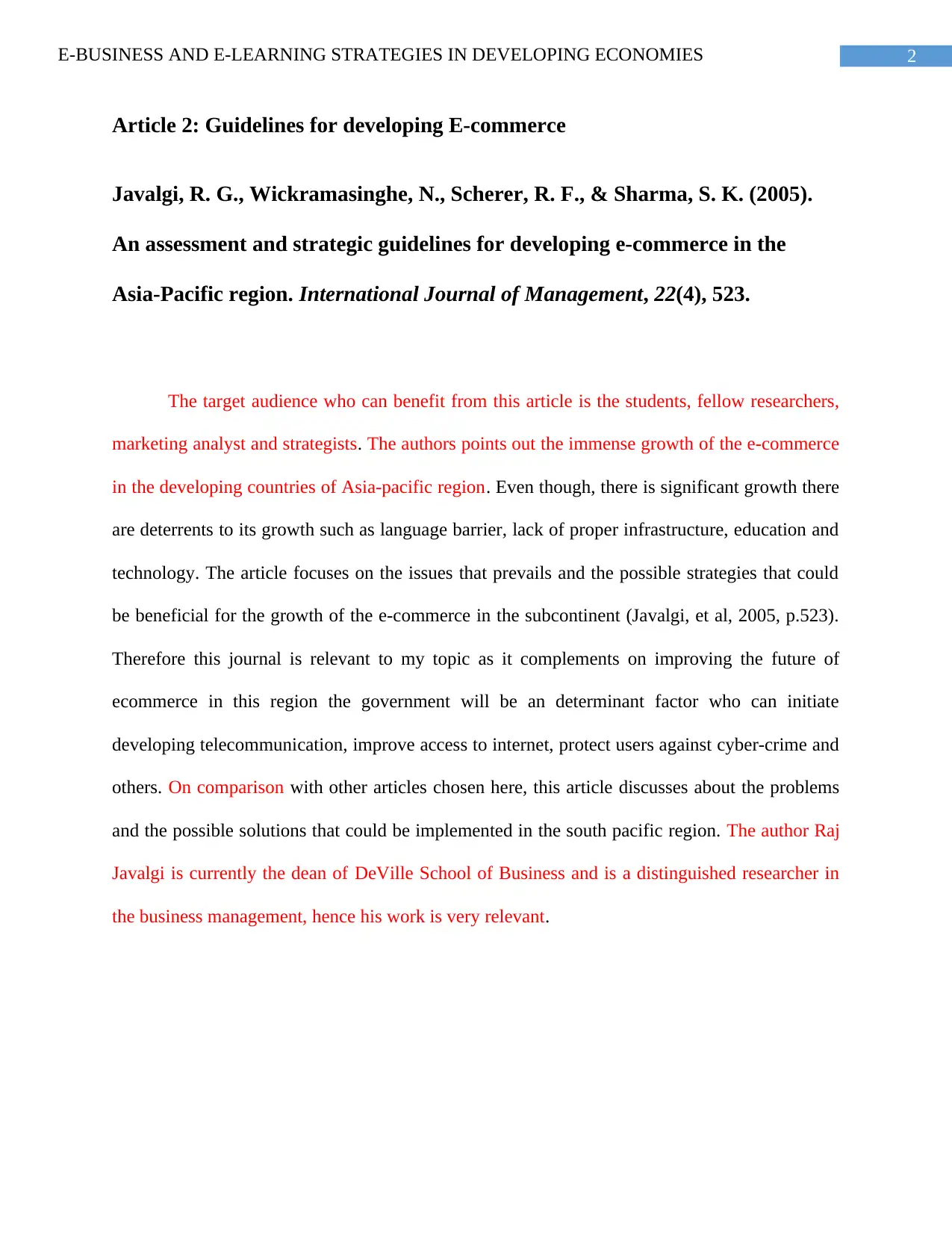
2E-BUSINESS AND E-LEARNING STRATEGIES IN DEVELOPING ECONOMIES
Article 2: Guidelines for developing E-commerce
Javalgi, R. G., Wickramasinghe, N., Scherer, R. F., & Sharma, S. K. (2005).
An assessment and strategic guidelines for developing e-commerce in the
Asia-Pacific region. International Journal of Management, 22(4), 523.
The target audience who can benefit from this article is the students, fellow researchers,
marketing analyst and strategists. The authors points out the immense growth of the e-commerce
in the developing countries of Asia-pacific region. Even though, there is significant growth there
are deterrents to its growth such as language barrier, lack of proper infrastructure, education and
technology. The article focuses on the issues that prevails and the possible strategies that could
be beneficial for the growth of the e-commerce in the subcontinent (Javalgi, et al, 2005, p.523).
Therefore this journal is relevant to my topic as it complements on improving the future of
ecommerce in this region the government will be an determinant factor who can initiate
developing telecommunication, improve access to internet, protect users against cyber-crime and
others. On comparison with other articles chosen here, this article discusses about the problems
and the possible solutions that could be implemented in the south pacific region. The author Raj
Javalgi is currently the dean of DeVille School of Business and is a distinguished researcher in
the business management, hence his work is very relevant.
Article 2: Guidelines for developing E-commerce
Javalgi, R. G., Wickramasinghe, N., Scherer, R. F., & Sharma, S. K. (2005).
An assessment and strategic guidelines for developing e-commerce in the
Asia-Pacific region. International Journal of Management, 22(4), 523.
The target audience who can benefit from this article is the students, fellow researchers,
marketing analyst and strategists. The authors points out the immense growth of the e-commerce
in the developing countries of Asia-pacific region. Even though, there is significant growth there
are deterrents to its growth such as language barrier, lack of proper infrastructure, education and
technology. The article focuses on the issues that prevails and the possible strategies that could
be beneficial for the growth of the e-commerce in the subcontinent (Javalgi, et al, 2005, p.523).
Therefore this journal is relevant to my topic as it complements on improving the future of
ecommerce in this region the government will be an determinant factor who can initiate
developing telecommunication, improve access to internet, protect users against cyber-crime and
others. On comparison with other articles chosen here, this article discusses about the problems
and the possible solutions that could be implemented in the south pacific region. The author Raj
Javalgi is currently the dean of DeVille School of Business and is a distinguished researcher in
the business management, hence his work is very relevant.
⊘ This is a preview!⊘
Do you want full access?
Subscribe today to unlock all pages.

Trusted by 1+ million students worldwide
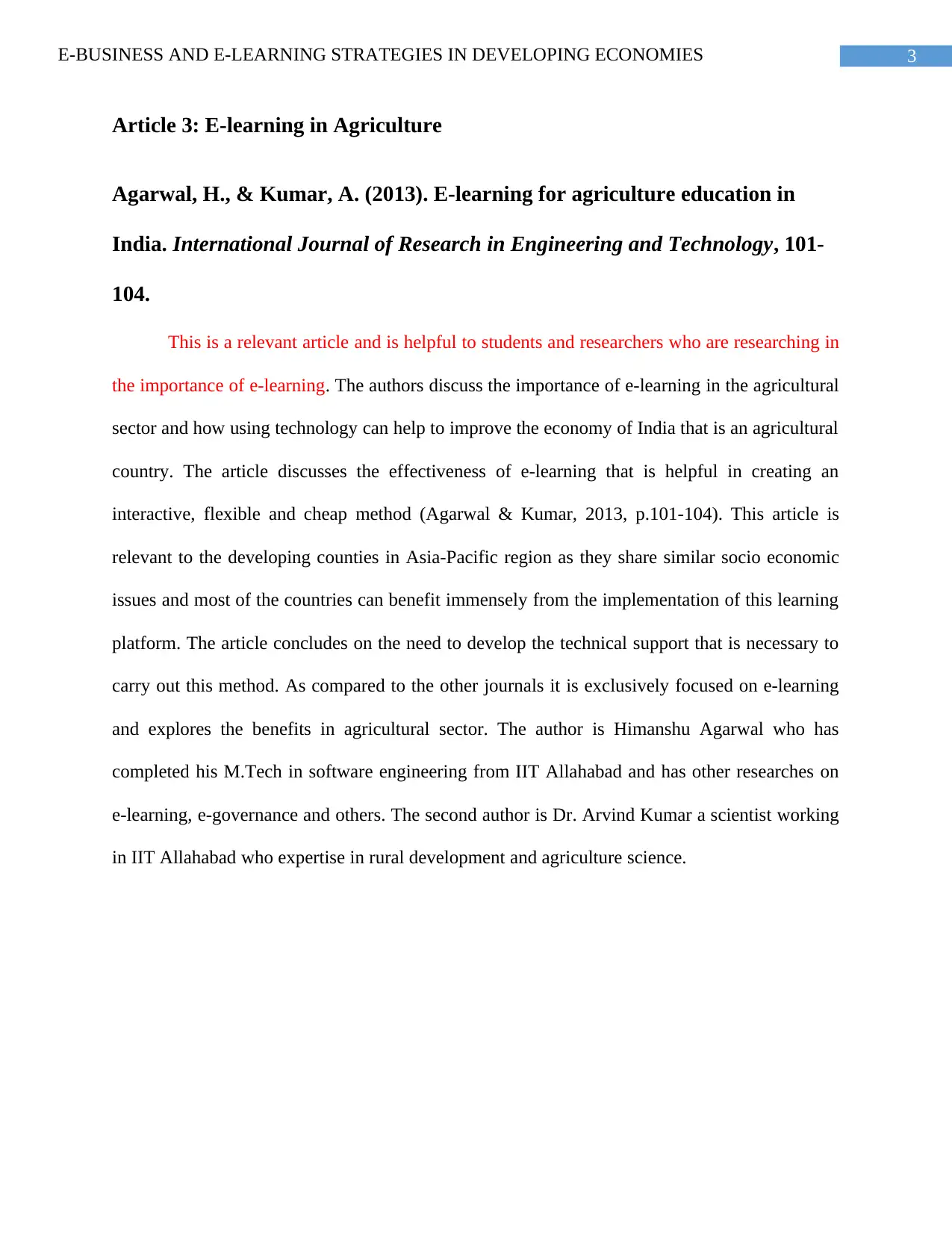
3E-BUSINESS AND E-LEARNING STRATEGIES IN DEVELOPING ECONOMIES
Article 3: E-learning in Agriculture
Agarwal, H., & Kumar, A. (2013). E-learning for agriculture education in
India. International Journal of Research in Engineering and Technology, 101-
104.
This is a relevant article and is helpful to students and researchers who are researching in
the importance of e-learning. The authors discuss the importance of e-learning in the agricultural
sector and how using technology can help to improve the economy of India that is an agricultural
country. The article discusses the effectiveness of e-learning that is helpful in creating an
interactive, flexible and cheap method (Agarwal & Kumar, 2013, p.101-104). This article is
relevant to the developing counties in Asia-Pacific region as they share similar socio economic
issues and most of the countries can benefit immensely from the implementation of this learning
platform. The article concludes on the need to develop the technical support that is necessary to
carry out this method. As compared to the other journals it is exclusively focused on e-learning
and explores the benefits in agricultural sector. The author is Himanshu Agarwal who has
completed his M.Tech in software engineering from IIT Allahabad and has other researches on
e-learning, e-governance and others. The second author is Dr. Arvind Kumar a scientist working
in IIT Allahabad who expertise in rural development and agriculture science.
Article 3: E-learning in Agriculture
Agarwal, H., & Kumar, A. (2013). E-learning for agriculture education in
India. International Journal of Research in Engineering and Technology, 101-
104.
This is a relevant article and is helpful to students and researchers who are researching in
the importance of e-learning. The authors discuss the importance of e-learning in the agricultural
sector and how using technology can help to improve the economy of India that is an agricultural
country. The article discusses the effectiveness of e-learning that is helpful in creating an
interactive, flexible and cheap method (Agarwal & Kumar, 2013, p.101-104). This article is
relevant to the developing counties in Asia-Pacific region as they share similar socio economic
issues and most of the countries can benefit immensely from the implementation of this learning
platform. The article concludes on the need to develop the technical support that is necessary to
carry out this method. As compared to the other journals it is exclusively focused on e-learning
and explores the benefits in agricultural sector. The author is Himanshu Agarwal who has
completed his M.Tech in software engineering from IIT Allahabad and has other researches on
e-learning, e-governance and others. The second author is Dr. Arvind Kumar a scientist working
in IIT Allahabad who expertise in rural development and agriculture science.
Paraphrase This Document
Need a fresh take? Get an instant paraphrase of this document with our AI Paraphraser
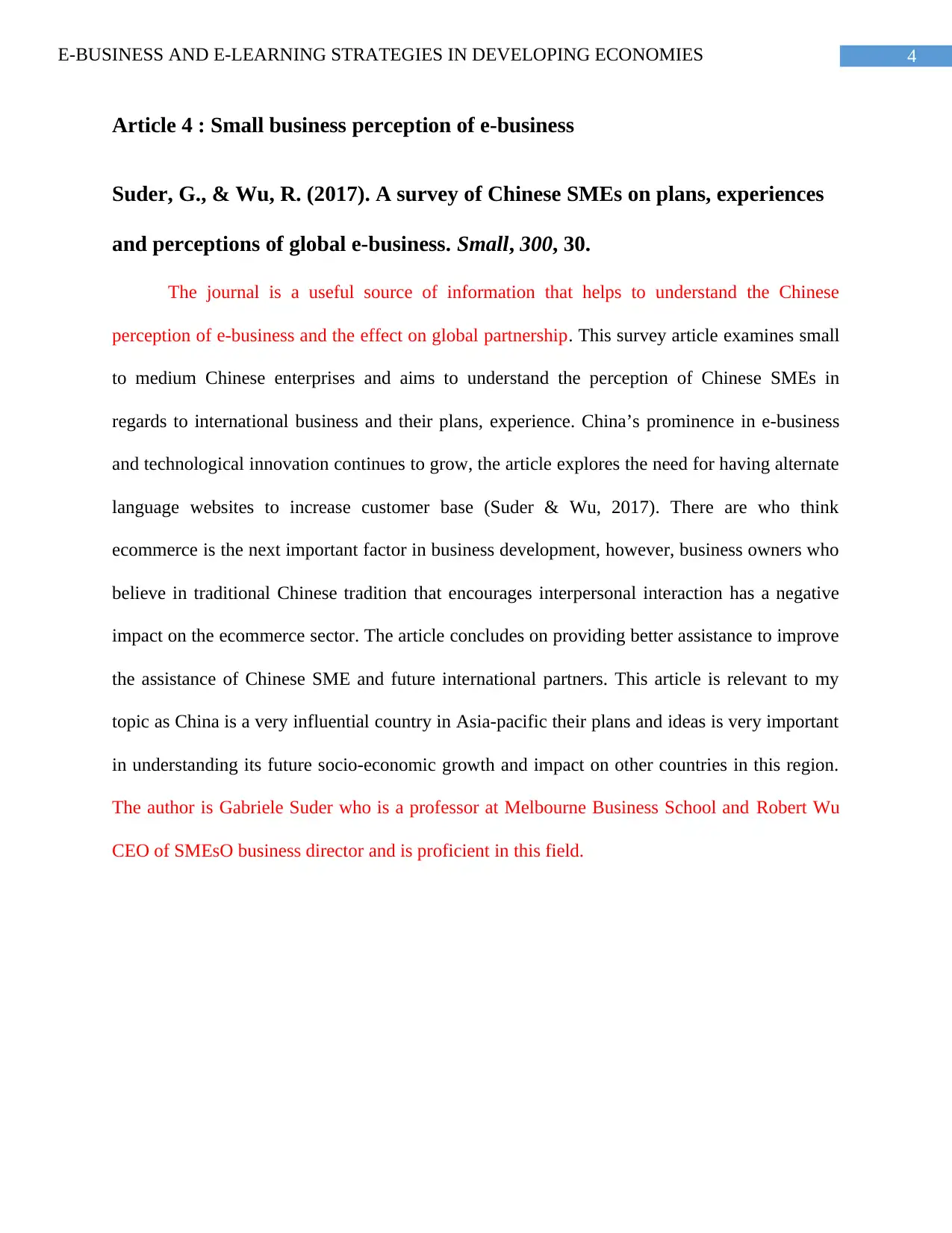
4E-BUSINESS AND E-LEARNING STRATEGIES IN DEVELOPING ECONOMIES
Article 4 : Small business perception of e-business
Suder, G., & Wu, R. (2017). A survey of Chinese SMEs on plans, experiences
and perceptions of global e-business. Small, 300, 30.
The journal is a useful source of information that helps to understand the Chinese
perception of e-business and the effect on global partnership. This survey article examines small
to medium Chinese enterprises and aims to understand the perception of Chinese SMEs in
regards to international business and their plans, experience. China’s prominence in e-business
and technological innovation continues to grow, the article explores the need for having alternate
language websites to increase customer base (Suder & Wu, 2017). There are who think
ecommerce is the next important factor in business development, however, business owners who
believe in traditional Chinese tradition that encourages interpersonal interaction has a negative
impact on the ecommerce sector. The article concludes on providing better assistance to improve
the assistance of Chinese SME and future international partners. This article is relevant to my
topic as China is a very influential country in Asia-pacific their plans and ideas is very important
in understanding its future socio-economic growth and impact on other countries in this region.
The author is Gabriele Suder who is a professor at Melbourne Business School and Robert Wu
CEO of SMEsO business director and is proficient in this field.
Article 4 : Small business perception of e-business
Suder, G., & Wu, R. (2017). A survey of Chinese SMEs on plans, experiences
and perceptions of global e-business. Small, 300, 30.
The journal is a useful source of information that helps to understand the Chinese
perception of e-business and the effect on global partnership. This survey article examines small
to medium Chinese enterprises and aims to understand the perception of Chinese SMEs in
regards to international business and their plans, experience. China’s prominence in e-business
and technological innovation continues to grow, the article explores the need for having alternate
language websites to increase customer base (Suder & Wu, 2017). There are who think
ecommerce is the next important factor in business development, however, business owners who
believe in traditional Chinese tradition that encourages interpersonal interaction has a negative
impact on the ecommerce sector. The article concludes on providing better assistance to improve
the assistance of Chinese SME and future international partners. This article is relevant to my
topic as China is a very influential country in Asia-pacific their plans and ideas is very important
in understanding its future socio-economic growth and impact on other countries in this region.
The author is Gabriele Suder who is a professor at Melbourne Business School and Robert Wu
CEO of SMEsO business director and is proficient in this field.
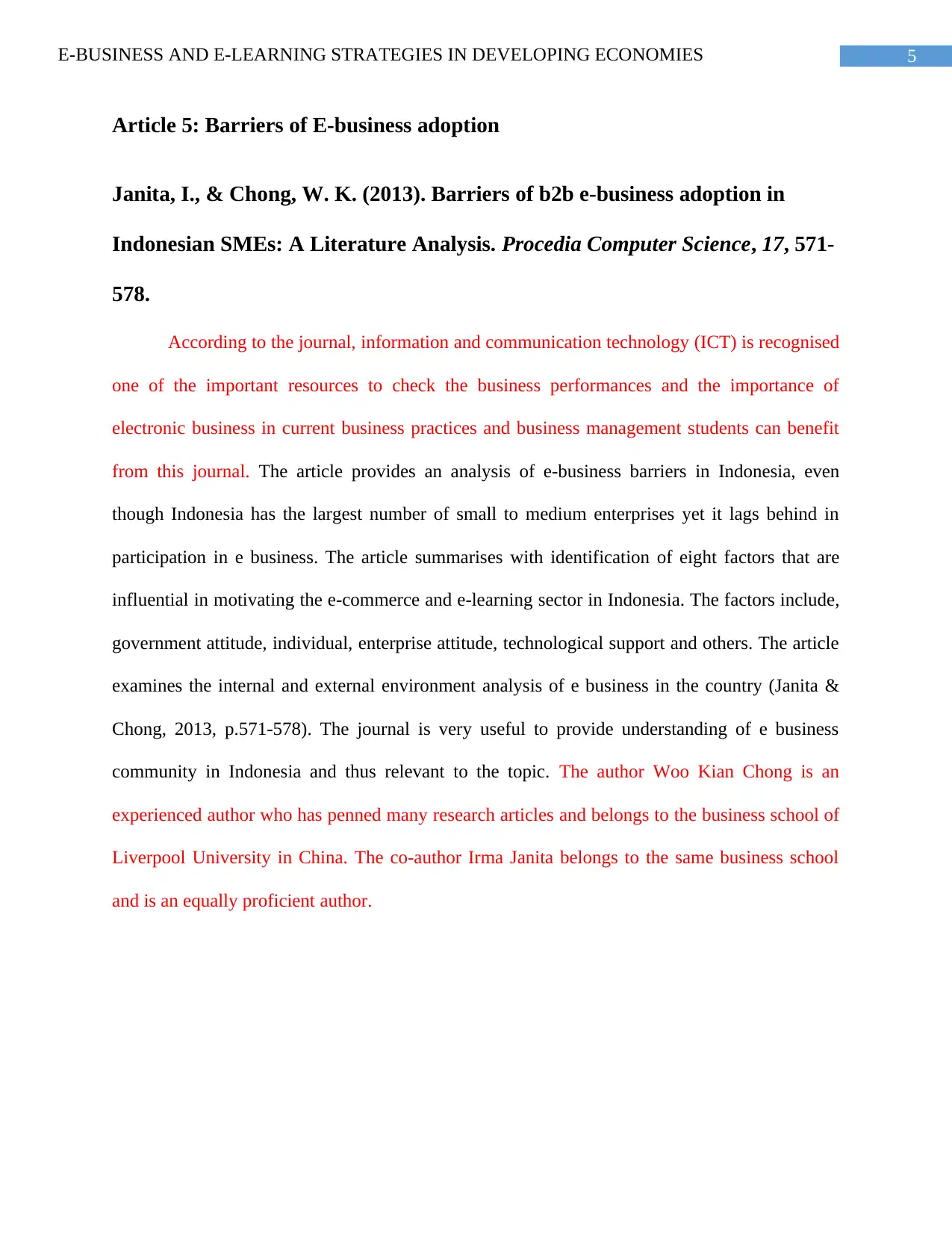
5E-BUSINESS AND E-LEARNING STRATEGIES IN DEVELOPING ECONOMIES
Article 5: Barriers of E-business adoption
Janita, I., & Chong, W. K. (2013). Barriers of b2b e-business adoption in
Indonesian SMEs: A Literature Analysis. Procedia Computer Science, 17, 571-
578.
According to the journal, information and communication technology (ICT) is recognised
one of the important resources to check the business performances and the importance of
electronic business in current business practices and business management students can benefit
from this journal. The article provides an analysis of e-business barriers in Indonesia, even
though Indonesia has the largest number of small to medium enterprises yet it lags behind in
participation in e business. The article summarises with identification of eight factors that are
influential in motivating the e-commerce and e-learning sector in Indonesia. The factors include,
government attitude, individual, enterprise attitude, technological support and others. The article
examines the internal and external environment analysis of e business in the country (Janita &
Chong, 2013, p.571-578). The journal is very useful to provide understanding of e business
community in Indonesia and thus relevant to the topic. The author Woo Kian Chong is an
experienced author who has penned many research articles and belongs to the business school of
Liverpool University in China. The co-author Irma Janita belongs to the same business school
and is an equally proficient author.
Article 5: Barriers of E-business adoption
Janita, I., & Chong, W. K. (2013). Barriers of b2b e-business adoption in
Indonesian SMEs: A Literature Analysis. Procedia Computer Science, 17, 571-
578.
According to the journal, information and communication technology (ICT) is recognised
one of the important resources to check the business performances and the importance of
electronic business in current business practices and business management students can benefit
from this journal. The article provides an analysis of e-business barriers in Indonesia, even
though Indonesia has the largest number of small to medium enterprises yet it lags behind in
participation in e business. The article summarises with identification of eight factors that are
influential in motivating the e-commerce and e-learning sector in Indonesia. The factors include,
government attitude, individual, enterprise attitude, technological support and others. The article
examines the internal and external environment analysis of e business in the country (Janita &
Chong, 2013, p.571-578). The journal is very useful to provide understanding of e business
community in Indonesia and thus relevant to the topic. The author Woo Kian Chong is an
experienced author who has penned many research articles and belongs to the business school of
Liverpool University in China. The co-author Irma Janita belongs to the same business school
and is an equally proficient author.
⊘ This is a preview!⊘
Do you want full access?
Subscribe today to unlock all pages.

Trusted by 1+ million students worldwide
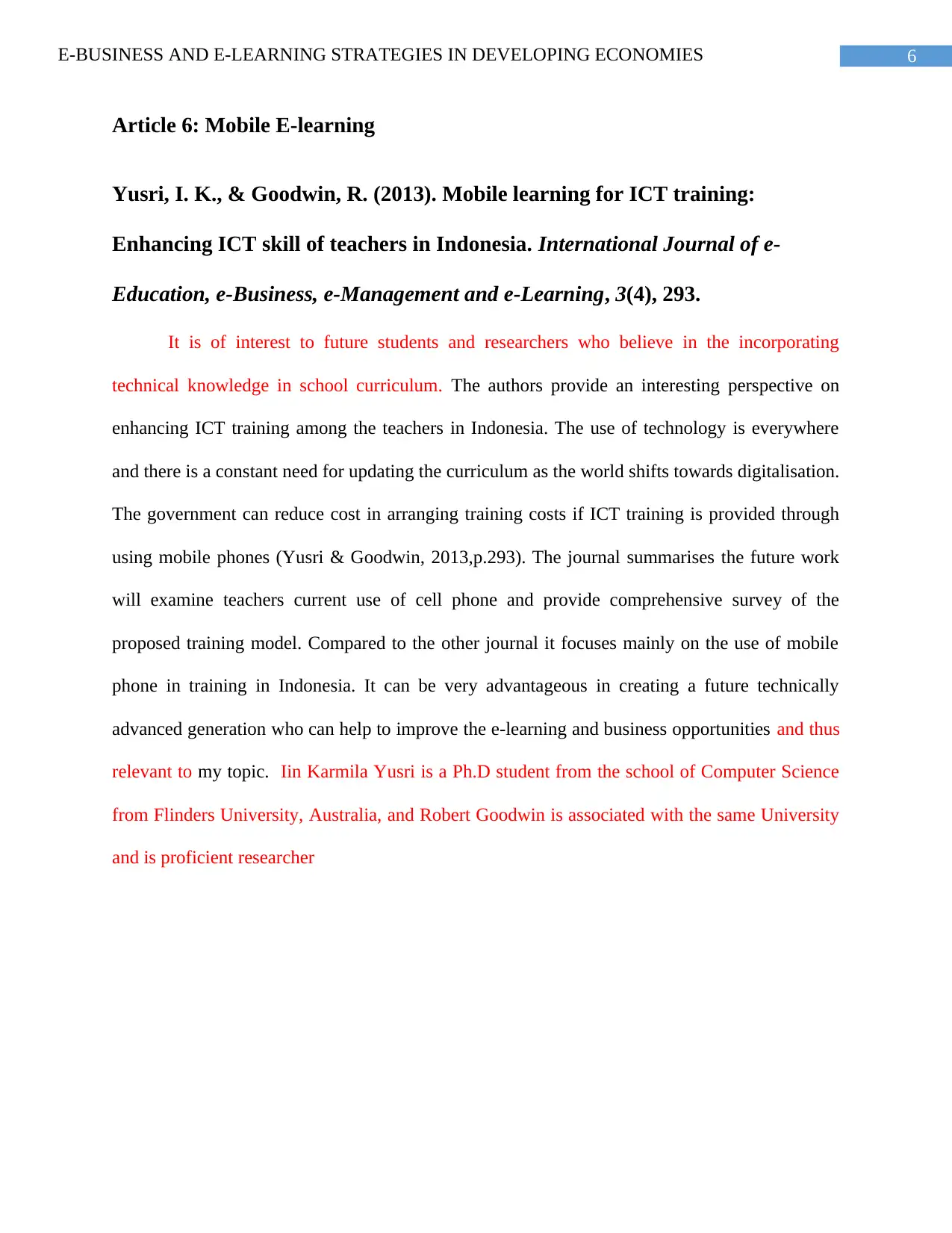
6E-BUSINESS AND E-LEARNING STRATEGIES IN DEVELOPING ECONOMIES
Article 6: Mobile E-learning
Yusri, I. K., & Goodwin, R. (2013). Mobile learning for ICT training:
Enhancing ICT skill of teachers in Indonesia. International Journal of e-
Education, e-Business, e-Management and e-Learning, 3(4), 293.
It is of interest to future students and researchers who believe in the incorporating
technical knowledge in school curriculum. The authors provide an interesting perspective on
enhancing ICT training among the teachers in Indonesia. The use of technology is everywhere
and there is a constant need for updating the curriculum as the world shifts towards digitalisation.
The government can reduce cost in arranging training costs if ICT training is provided through
using mobile phones (Yusri & Goodwin, 2013,p.293). The journal summarises the future work
will examine teachers current use of cell phone and provide comprehensive survey of the
proposed training model. Compared to the other journal it focuses mainly on the use of mobile
phone in training in Indonesia. It can be very advantageous in creating a future technically
advanced generation who can help to improve the e-learning and business opportunities and thus
relevant to my topic. Iin Karmila Yusri is a Ph.D student from the school of Computer Science
from Flinders University, Australia, and Robert Goodwin is associated with the same University
and is proficient researcher
Article 6: Mobile E-learning
Yusri, I. K., & Goodwin, R. (2013). Mobile learning for ICT training:
Enhancing ICT skill of teachers in Indonesia. International Journal of e-
Education, e-Business, e-Management and e-Learning, 3(4), 293.
It is of interest to future students and researchers who believe in the incorporating
technical knowledge in school curriculum. The authors provide an interesting perspective on
enhancing ICT training among the teachers in Indonesia. The use of technology is everywhere
and there is a constant need for updating the curriculum as the world shifts towards digitalisation.
The government can reduce cost in arranging training costs if ICT training is provided through
using mobile phones (Yusri & Goodwin, 2013,p.293). The journal summarises the future work
will examine teachers current use of cell phone and provide comprehensive survey of the
proposed training model. Compared to the other journal it focuses mainly on the use of mobile
phone in training in Indonesia. It can be very advantageous in creating a future technically
advanced generation who can help to improve the e-learning and business opportunities and thus
relevant to my topic. Iin Karmila Yusri is a Ph.D student from the school of Computer Science
from Flinders University, Australia, and Robert Goodwin is associated with the same University
and is proficient researcher
Paraphrase This Document
Need a fresh take? Get an instant paraphrase of this document with our AI Paraphraser
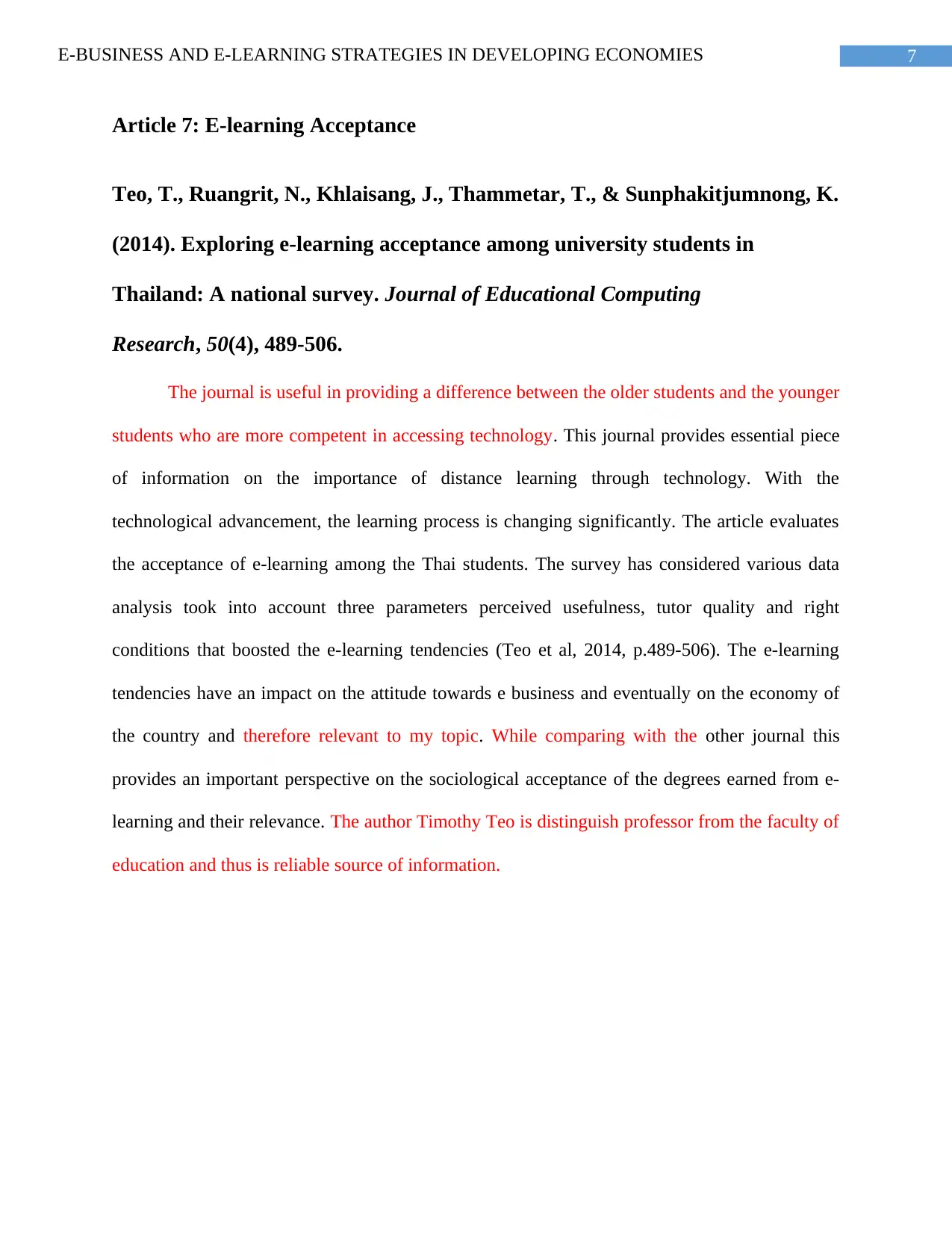
7E-BUSINESS AND E-LEARNING STRATEGIES IN DEVELOPING ECONOMIES
Article 7: E-learning Acceptance
Teo, T., Ruangrit, N., Khlaisang, J., Thammetar, T., & Sunphakitjumnong, K.
(2014). Exploring e-learning acceptance among university students in
Thailand: A national survey. Journal of Educational Computing
Research, 50(4), 489-506.
The journal is useful in providing a difference between the older students and the younger
students who are more competent in accessing technology. This journal provides essential piece
of information on the importance of distance learning through technology. With the
technological advancement, the learning process is changing significantly. The article evaluates
the acceptance of e-learning among the Thai students. The survey has considered various data
analysis took into account three parameters perceived usefulness, tutor quality and right
conditions that boosted the e-learning tendencies (Teo et al, 2014, p.489-506). The e-learning
tendencies have an impact on the attitude towards e business and eventually on the economy of
the country and therefore relevant to my topic. While comparing with the other journal this
provides an important perspective on the sociological acceptance of the degrees earned from e-
learning and their relevance. The author Timothy Teo is distinguish professor from the faculty of
education and thus is reliable source of information.
Article 7: E-learning Acceptance
Teo, T., Ruangrit, N., Khlaisang, J., Thammetar, T., & Sunphakitjumnong, K.
(2014). Exploring e-learning acceptance among university students in
Thailand: A national survey. Journal of Educational Computing
Research, 50(4), 489-506.
The journal is useful in providing a difference between the older students and the younger
students who are more competent in accessing technology. This journal provides essential piece
of information on the importance of distance learning through technology. With the
technological advancement, the learning process is changing significantly. The article evaluates
the acceptance of e-learning among the Thai students. The survey has considered various data
analysis took into account three parameters perceived usefulness, tutor quality and right
conditions that boosted the e-learning tendencies (Teo et al, 2014, p.489-506). The e-learning
tendencies have an impact on the attitude towards e business and eventually on the economy of
the country and therefore relevant to my topic. While comparing with the other journal this
provides an important perspective on the sociological acceptance of the degrees earned from e-
learning and their relevance. The author Timothy Teo is distinguish professor from the faculty of
education and thus is reliable source of information.
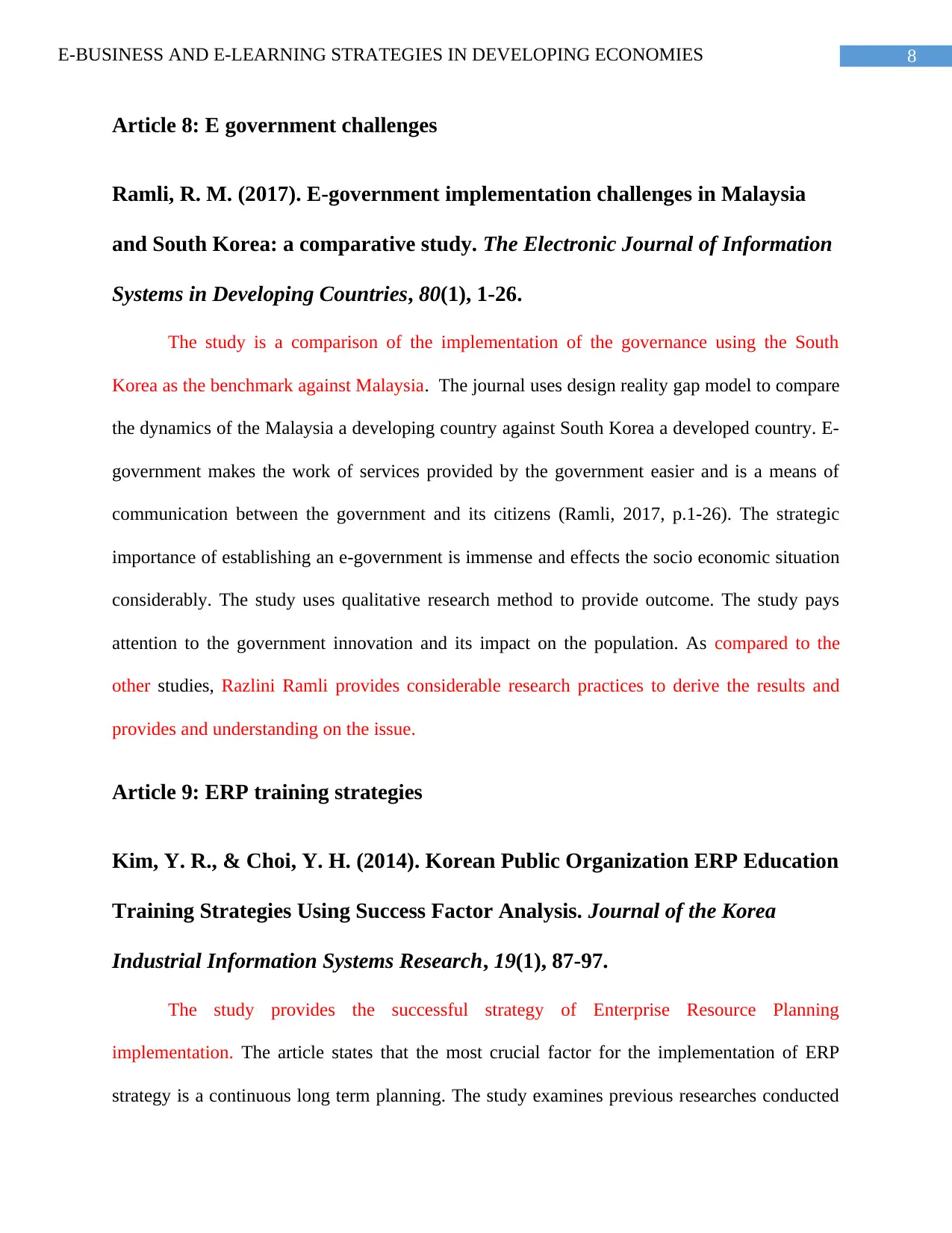
8E-BUSINESS AND E-LEARNING STRATEGIES IN DEVELOPING ECONOMIES
Article 8: E government challenges
Ramli, R. M. (2017). E‐government implementation challenges in Malaysia
and South Korea: a comparative study. The Electronic Journal of Information
Systems in Developing Countries, 80(1), 1-26.
The study is a comparison of the implementation of the governance using the South
Korea as the benchmark against Malaysia. The journal uses design reality gap model to compare
the dynamics of the Malaysia a developing country against South Korea a developed country. E-
government makes the work of services provided by the government easier and is a means of
communication between the government and its citizens (Ramli, 2017, p.1-26). The strategic
importance of establishing an e-government is immense and effects the socio economic situation
considerably. The study uses qualitative research method to provide outcome. The study pays
attention to the government innovation and its impact on the population. As compared to the
other studies, Razlini Ramli provides considerable research practices to derive the results and
provides and understanding on the issue.
Article 9: ERP training strategies
Kim, Y. R., & Choi, Y. H. (2014). Korean Public Organization ERP Education
Training Strategies Using Success Factor Analysis. Journal of the Korea
Industrial Information Systems Research, 19(1), 87-97.
The study provides the successful strategy of Enterprise Resource Planning
implementation. The article states that the most crucial factor for the implementation of ERP
strategy is a continuous long term planning. The study examines previous researches conducted
Article 8: E government challenges
Ramli, R. M. (2017). E‐government implementation challenges in Malaysia
and South Korea: a comparative study. The Electronic Journal of Information
Systems in Developing Countries, 80(1), 1-26.
The study is a comparison of the implementation of the governance using the South
Korea as the benchmark against Malaysia. The journal uses design reality gap model to compare
the dynamics of the Malaysia a developing country against South Korea a developed country. E-
government makes the work of services provided by the government easier and is a means of
communication between the government and its citizens (Ramli, 2017, p.1-26). The strategic
importance of establishing an e-government is immense and effects the socio economic situation
considerably. The study uses qualitative research method to provide outcome. The study pays
attention to the government innovation and its impact on the population. As compared to the
other studies, Razlini Ramli provides considerable research practices to derive the results and
provides and understanding on the issue.
Article 9: ERP training strategies
Kim, Y. R., & Choi, Y. H. (2014). Korean Public Organization ERP Education
Training Strategies Using Success Factor Analysis. Journal of the Korea
Industrial Information Systems Research, 19(1), 87-97.
The study provides the successful strategy of Enterprise Resource Planning
implementation. The article states that the most crucial factor for the implementation of ERP
strategy is a continuous long term planning. The study examines previous researches conducted
⊘ This is a preview!⊘
Do you want full access?
Subscribe today to unlock all pages.

Trusted by 1+ million students worldwide
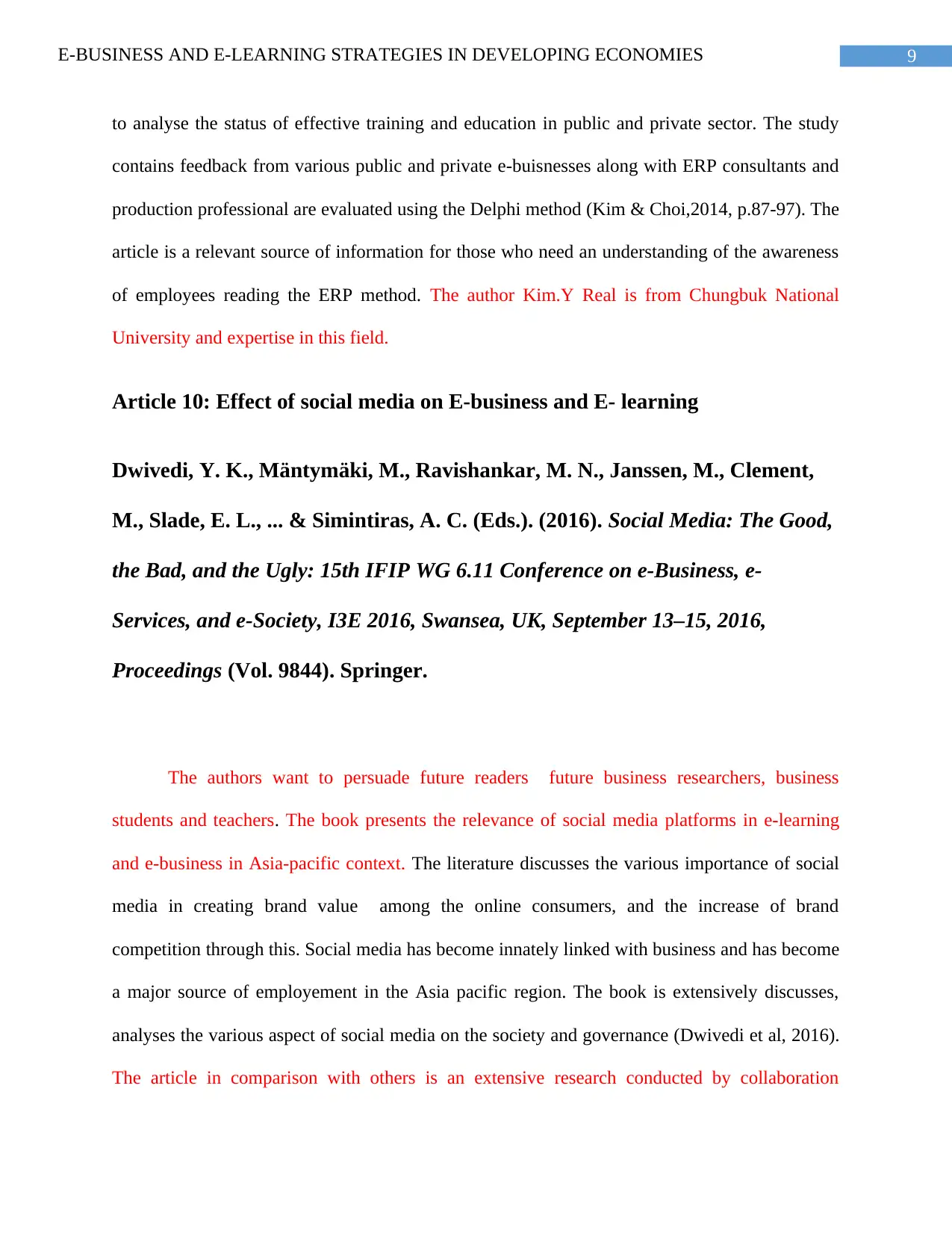
9E-BUSINESS AND E-LEARNING STRATEGIES IN DEVELOPING ECONOMIES
to analyse the status of effective training and education in public and private sector. The study
contains feedback from various public and private e-buisnesses along with ERP consultants and
production professional are evaluated using the Delphi method (Kim & Choi,2014, p.87-97). The
article is a relevant source of information for those who need an understanding of the awareness
of employees reading the ERP method. The author Kim.Y Real is from Chungbuk National
University and expertise in this field.
Article 10: Effect of social media on E-business and E- learning
Dwivedi, Y. K., Mäntymäki, M., Ravishankar, M. N., Janssen, M., Clement,
M., Slade, E. L., ... & Simintiras, A. C. (Eds.). (2016). Social Media: The Good,
the Bad, and the Ugly: 15th IFIP WG 6.11 Conference on e-Business, e-
Services, and e-Society, I3E 2016, Swansea, UK, September 13–15, 2016,
Proceedings (Vol. 9844). Springer.
The authors want to persuade future readers future business researchers, business
students and teachers. The book presents the relevance of social media platforms in e-learning
and e-business in Asia-pacific context. The literature discusses the various importance of social
media in creating brand value among the online consumers, and the increase of brand
competition through this. Social media has become innately linked with business and has become
a major source of employement in the Asia pacific region. The book is extensively discusses,
analyses the various aspect of social media on the society and governance (Dwivedi et al, 2016).
The article in comparison with others is an extensive research conducted by collaboration
to analyse the status of effective training and education in public and private sector. The study
contains feedback from various public and private e-buisnesses along with ERP consultants and
production professional are evaluated using the Delphi method (Kim & Choi,2014, p.87-97). The
article is a relevant source of information for those who need an understanding of the awareness
of employees reading the ERP method. The author Kim.Y Real is from Chungbuk National
University and expertise in this field.
Article 10: Effect of social media on E-business and E- learning
Dwivedi, Y. K., Mäntymäki, M., Ravishankar, M. N., Janssen, M., Clement,
M., Slade, E. L., ... & Simintiras, A. C. (Eds.). (2016). Social Media: The Good,
the Bad, and the Ugly: 15th IFIP WG 6.11 Conference on e-Business, e-
Services, and e-Society, I3E 2016, Swansea, UK, September 13–15, 2016,
Proceedings (Vol. 9844). Springer.
The authors want to persuade future readers future business researchers, business
students and teachers. The book presents the relevance of social media platforms in e-learning
and e-business in Asia-pacific context. The literature discusses the various importance of social
media in creating brand value among the online consumers, and the increase of brand
competition through this. Social media has become innately linked with business and has become
a major source of employement in the Asia pacific region. The book is extensively discusses,
analyses the various aspect of social media on the society and governance (Dwivedi et al, 2016).
The article in comparison with others is an extensive research conducted by collaboration
Paraphrase This Document
Need a fresh take? Get an instant paraphrase of this document with our AI Paraphraser

10E-BUSINESS AND E-LEARNING STRATEGIES IN DEVELOPING ECONOMIES
various authors mainly on the effects of social media and business. The author Yogesh Dwivedi
is an experienced author from the business department of Swansea University.
various authors mainly on the effects of social media and business. The author Yogesh Dwivedi
is an experienced author from the business department of Swansea University.
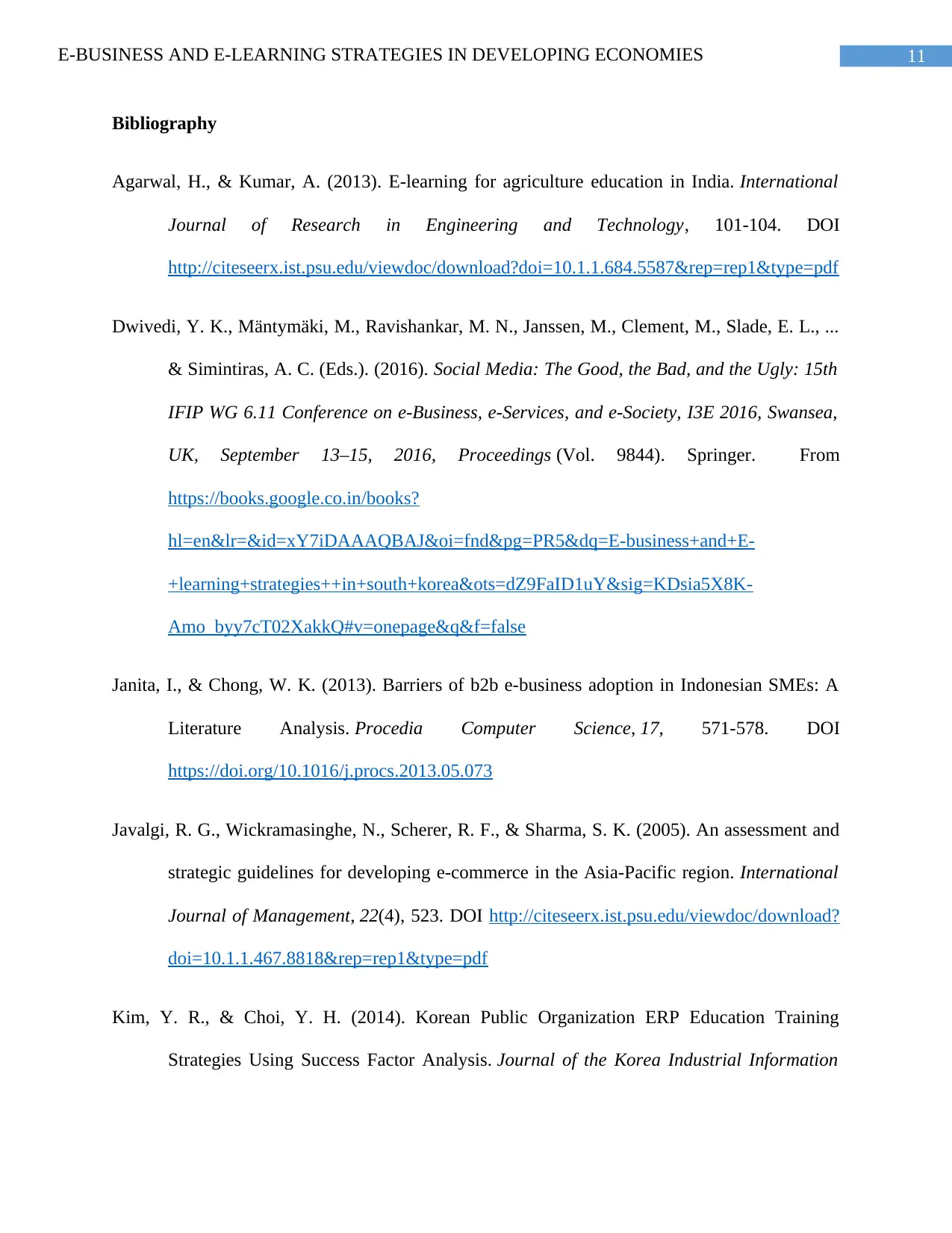
11E-BUSINESS AND E-LEARNING STRATEGIES IN DEVELOPING ECONOMIES
Bibliography
Agarwal, H., & Kumar, A. (2013). E-learning for agriculture education in India. International
Journal of Research in Engineering and Technology, 101-104. DOI
http://citeseerx.ist.psu.edu/viewdoc/download?doi=10.1.1.684.5587&rep=rep1&type=pdf
Dwivedi, Y. K., Mäntymäki, M., Ravishankar, M. N., Janssen, M., Clement, M., Slade, E. L., ...
& Simintiras, A. C. (Eds.). (2016). Social Media: The Good, the Bad, and the Ugly: 15th
IFIP WG 6.11 Conference on e-Business, e-Services, and e-Society, I3E 2016, Swansea,
UK, September 13–15, 2016, Proceedings (Vol. 9844). Springer. From
https://books.google.co.in/books?
hl=en&lr=&id=xY7iDAAAQBAJ&oi=fnd&pg=PR5&dq=E-business+and+E-
+learning+strategies++in+south+korea&ots=dZ9FaID1uY&sig=KDsia5X8K-
Amo_byy7cT02XakkQ#v=onepage&q&f=false
Janita, I., & Chong, W. K. (2013). Barriers of b2b e-business adoption in Indonesian SMEs: A
Literature Analysis. Procedia Computer Science, 17, 571-578. DOI
https://doi.org/10.1016/j.procs.2013.05.073
Javalgi, R. G., Wickramasinghe, N., Scherer, R. F., & Sharma, S. K. (2005). An assessment and
strategic guidelines for developing e-commerce in the Asia-Pacific region. International
Journal of Management, 22(4), 523. DOI http://citeseerx.ist.psu.edu/viewdoc/download?
doi=10.1.1.467.8818&rep=rep1&type=pdf
Kim, Y. R., & Choi, Y. H. (2014). Korean Public Organization ERP Education Training
Strategies Using Success Factor Analysis. Journal of the Korea Industrial Information
Bibliography
Agarwal, H., & Kumar, A. (2013). E-learning for agriculture education in India. International
Journal of Research in Engineering and Technology, 101-104. DOI
http://citeseerx.ist.psu.edu/viewdoc/download?doi=10.1.1.684.5587&rep=rep1&type=pdf
Dwivedi, Y. K., Mäntymäki, M., Ravishankar, M. N., Janssen, M., Clement, M., Slade, E. L., ...
& Simintiras, A. C. (Eds.). (2016). Social Media: The Good, the Bad, and the Ugly: 15th
IFIP WG 6.11 Conference on e-Business, e-Services, and e-Society, I3E 2016, Swansea,
UK, September 13–15, 2016, Proceedings (Vol. 9844). Springer. From
https://books.google.co.in/books?
hl=en&lr=&id=xY7iDAAAQBAJ&oi=fnd&pg=PR5&dq=E-business+and+E-
+learning+strategies++in+south+korea&ots=dZ9FaID1uY&sig=KDsia5X8K-
Amo_byy7cT02XakkQ#v=onepage&q&f=false
Janita, I., & Chong, W. K. (2013). Barriers of b2b e-business adoption in Indonesian SMEs: A
Literature Analysis. Procedia Computer Science, 17, 571-578. DOI
https://doi.org/10.1016/j.procs.2013.05.073
Javalgi, R. G., Wickramasinghe, N., Scherer, R. F., & Sharma, S. K. (2005). An assessment and
strategic guidelines for developing e-commerce in the Asia-Pacific region. International
Journal of Management, 22(4), 523. DOI http://citeseerx.ist.psu.edu/viewdoc/download?
doi=10.1.1.467.8818&rep=rep1&type=pdf
Kim, Y. R., & Choi, Y. H. (2014). Korean Public Organization ERP Education Training
Strategies Using Success Factor Analysis. Journal of the Korea Industrial Information
⊘ This is a preview!⊘
Do you want full access?
Subscribe today to unlock all pages.

Trusted by 1+ million students worldwide
1 out of 13
Related Documents
Your All-in-One AI-Powered Toolkit for Academic Success.
+13062052269
info@desklib.com
Available 24*7 on WhatsApp / Email
![[object Object]](/_next/static/media/star-bottom.7253800d.svg)
Unlock your academic potential
Copyright © 2020–2025 A2Z Services. All Rights Reserved. Developed and managed by ZUCOL.





